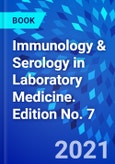- Procedural protocols help you transition from immunology theory to practical aspects of the clinical lab. - Case studies allow you to apply your knowledge to real-world situations and strengthen your critical thinking skills. - Updated illustrations, photographs, and summary tables visually clarify key concepts and information. - Full-color presentation clearly showcases diagrams and micrographs, giving you a sense of what you will encounter in the lab. - Learning objectives and key terms at the beginning of each chapter provide measurable outcomes and a framework for organizing your study efforts. - Review questions at the end of each chapter provide you with review and self-assessment opportunities. - NEW! Highlights of Immunology chapter presents a clear, accessible, and easy-to-understand introduction to immunology that will help you grasp the complex concepts you need to understand to practice in the clinical lab. - NEW! Stronger focus on molecular laboratory techniques. - NEW! Ten chapters include COVID-19 related topics, including Primer on Vaccines chapter covering newer vaccine production methods focusing on DNA and RNA nucleic acids and viral vectors, and covering eight different platforms in use for vaccine research and development against SARS-CoV-2 virus. - NEW! All chapters include significant updates based on reviewer feedback. - NEW! Key Concepts interwoven throughout each chapter highlight important facts for more focused learning.
Table of Contents
Part I: Basic Immunologic Mechanisms1. Highlights of Innate and Adaptive Immune Systems
2. Soluble Mediators of the Immune System
3. Antigens and Antibodies
4. Cellular Activities and Clinical Disorders of Innate and Adaptive Immunity
Part II: The Theory of Immunologic and Serologic Procedures
5. Basic Safety in the Immunology-Serology Laboratory
6. Quality Assurance and Quality Control Practices
7. Basic Serologic Laboratory: Techniques and Clinical Applications
8. Precipitation and Particle Agglutination Methods
9. Electrophoresis Techniques
10. Labeling Techniques in Immunoassay
11. Flow Cytometry
12. Molecular Laboratory Techniques
Part III: Immunologic Manifestations of Infectious Diseases
13. Infectious Diseases: Overview & TORCH Diseases
14. Streptococcal Infections
15. Syphilis
16. Vector-Borne Diseases
17. Infectious Mononucleosis
18. Viral Hepatitis
Part IV: Immune Disorders
19. Primary and Acquired (Secondary) Immune Deficiencies
20. Hypersensitivity Reactions
21. Immunoproliferative Disorders
22. Tolerance, Autoimmunity and Autoimmune Disorders
23. Systemic Lupus Erythematosus
24. Rheumatoid Arthritis
Part V: Transplantation & Tumor Immunology
25. Transplantation: HLA, Solid Organ, and Hematopoietic Stem Cells
26. Tumor Immunology and Up-to-Date Applications of Next Generation Sequencing
Part VI: Vaccines
27. Primer on Vaccines
Appendix A: Answers to Case Study Multiple-Choice Questions
Appendix B: Answers to Review Questions
Appendix C: Origin and Immunoregulatory Activity of Cytokines
Bibliography
Glossary
Authors
Mary Louise Turgeon Clinical Laboratory Education Consultant, Mary L. Turgeon and Associates, Boston, Massachusetts; St. Petersburg, Florida; Associate Professor, Chair, Department of Medical Laboratory Science (previous), Northeastern University, Bouve College of Health Professions, Boston, Massachusetts; Professor, Program Director (previous), Medical Laboratory Technology, Corning Community College, Corning, New York. Mary Louise Turgeon, EdD, MLS(ASCP)CM, is an educator, author, and consultant in medical laboratory science education. Her career includes roles as a community college professor, Medical Laboratory Technology program director, undergraduate and graduate university professor, Medical Laboratory Science program director, and departmental chairperson. Dr. Turgeon is currently an ad hoc educational content specialist for the College of Professional Studies, Northeastern University, Boston,and maintains an active clinical laboratory science consulting practice. Her practice, Mary L. Turgeon and Associates, focuses on new program development, curriculum revision, and increasing teaching effectiveness
through the use of technology and interactive teaching strategies.








